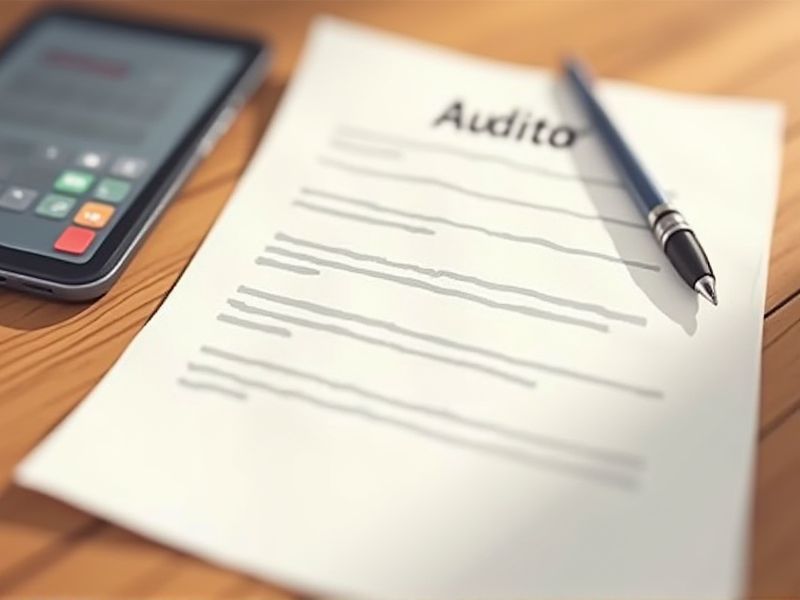
Charity Auditors play a crucial role in ensuring financial transparency and accountability within nonprofit organizations. Certifications equip auditors with specialized skills and knowledge required to navigate complex financial regulations and ethical standards specific to the nonprofit sector. These credentials enhance an auditor's credibility and trustworthiness, which are essential for building stakeholder confidence. Below are some important certifications you may need as a Charity Auditor.
Certified Public Accountant (CPA)
Certified Public Accountants are needed for charity auditors to ensure financial statements are accurate and comply with relevant regulations, enhancing trust among donors. Their expertise in tax laws and nonprofit accounting standards helps identify potential financial discrepancies and ensures appropriate fund usage. CPAs also provide assurance of sound financial management, which is crucial for maintaining the charity's reputation and credibility. Their independent and objective evaluations reinforce organizational transparency and accountability, vital for both regulatory compliance and public confidence.
Certified Internal Auditor (CIA)
The necessity for a Certified Internal Auditor in the role of a charity auditor arises due to the CIA's expertise in risk management and internal controls, ensuring the charity's financial resources are effectively safeguarded. Charities encounter complex regulatory environments, and a CIA's understanding of compliance standards helps organizations adhere to legal requirements. Increased donor skepticism necessitates transparency, where a CIA's skills in auditing and reporting enhance trustworthiness and accountability for stakeholders. CIA professionals possess proficiency in process evaluation, enabling them to streamline operations and maximize resource efficiency within charitable organizations.
Certified Fraud Examiner (CFE)
Certified Fraud Examiners possess specialized skills in detecting and preventing fraud, which is crucial for maintaining the financial integrity of a charity. Their expertise helps identify vulnerabilities in a charity's financial processes, mitigating the risk of misappropriation of funds. CFEs can enhance the credibility and transparency of a charity's financial reporting, fostering trust among donors and stakeholders. The presence of a CFE ensures compliance with regulatory standards, reducing the likelihood of legal repercussions for the organization.
Certified Government Financial Manager (CGFM)
The CGFM credential ensures auditors have a solid understanding of governmental financial processes, crucial for accurately evaluating a charity's compliance with state and federal regulations. It offers specialized knowledge in government-specific accounting standards, which is essential for auditing organizations receiving public funding. Certification demonstrates a commitment to ethical standards and continuous learning, enhancing trust in the audit process. As charities often engage in complex financial transactions and reporting involving tax-exempt income, a CGFM's expertise helps in navigating these intricacies effectively.
Certified Risk Management Assurance (CRMA)
Charity auditors encounter complex financial landscapes where effective risk management is essential to ensure donor funds are safeguarded and appropriately utilized. Holding a CRMA demonstrates an auditor's proficiency in evaluating and improving risk management and governance processes within a charity. By possessing this certification, an auditor can better identify potential risks that may affect a charity's financial health and compliance. Organizations benefit from the assurance that financial practices align with ethical standards and legal regulations.
Chartered Accountant (CA)
Chartered Accountants (CAs) possess the necessary expertise in financial regulations and tax laws, enabling accurate compliance for charities. Their robust auditing skills ensure an organization's financial integrity and transparency to donors and stakeholders. CAs bring objectivity and a high standard of scrutiny, reducing the risk of fraud and mismanagement. The presence of a CA auditor enhances confidence in the charity's financial accountability and governance.
Certified in Financial Forensics (CFF)
Charity auditors face increasing complexities in detecting financial discrepancies and fraud, a challenge that the CFF credential addresses through specialized forensic skills. As charities handle significant public funds, accountability becomes paramount, and the CFF ensures auditors are equipped to maintain transparency and integrity. The certification provides auditors with advanced knowledge in areas like fraud prevention and investigation, directly impacting the trust between charities and their stakeholders. By being CFF certified, charity auditors enhance their ability to uncover financial mismanagement, strengthening financial reporting and compliance in the non-profit sector.
Certified Management Accountant (CMA)
The Certified Management Accountant (CMA) designation brings advanced financial analysis and reporting skills, essential for managing the complex financial structures of charities. Expertise in strategic management and decision support helps charity auditors ensure funds are used effectively and align with organizational missions. Knowledge in risk management and internal controls is crucial, protecting charities from financial mismanagement or fraud. Proficiency in budgeting and forecasting enables accurate predictions and resource allocation, further enhancing the financial health of charitable organizations.
Certified Information Systems Auditor (CISA)
Organizations handling charitable funds require strict oversight to ensure proper financial management. Certified Information Systems Auditor (CISA) professionals provide expertise in evaluating the integrity, confidentiality, and availability of information systems. Their skills ensure that financial transactions and donor information are secure and compliant with relevant regulations. Charities benefit from CISA-certified individuals by gaining credibility and trust from donors and stakeholders.
Chartered Institute of Public Finance and Accountancy (CIPFA)
Charity auditors need the Chartered Institute of Public Finance and Accountancy (CIPFA) to ensure adherence to rigorous financial standards that promote transparency and accountability. CIPFA provides specialized training and resources that help auditors effectively navigate the unique financial challenges faced by charities. With CIPFA's expertise, auditors can better identify and mitigate financial risks, safeguarding the organization's assets and public trust. The integration of CIPFA's knowledge and standards enhances the credibility and reliability of charity audits, fostering donor confidence and support.
Summary
When you obtain certifications as a Charity Auditor, your ability to evaluate charitable organizations' financial health improves. This expertise enhances trust and credibility among stakeholders, leading to increased transparency and accountability in the nonprofit sector. As charities become more financially accountable, donor confidence typically strengthens, potentially boosting donations and support. Ultimately, your skills contribute to the integrity and sustainability of charitable activities.
